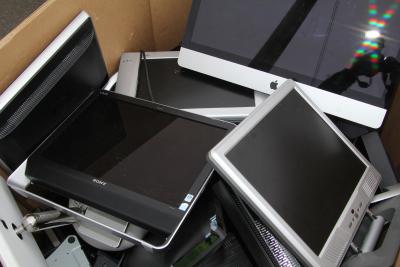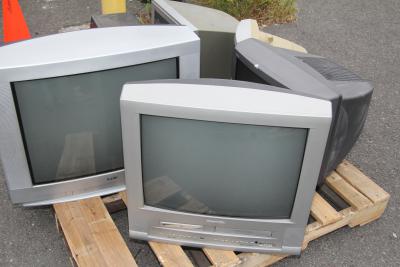
E-cycling is the Law:
Virginia law requires any manufacturer that sells (or offers for sale) more than 500 units of computer equipment in the state to provide an opportunity for customers to return or recycle their equipment at no charge.
See also:
- Environmental Protection Agency's E-cycling List
- Computer & Electronics Recycling | Virginia DEQ
- Manufacturers with a Recovery Plan for VDEQ
Available to Residents ONLY (NO COMMERCIAL DROP-OFF):
Proof of Fairfax County residency may be required. Acceptable proof is a driver's license, state ID card, property tax bill or utility bill.
- This program is a community service to the residents of Fairfax County only and is not open to businesses, government agencies, non-profits, schools, universities, institutions, home-based businesses, or general industry.
- Please note that there is a MAXIMUM limit of ten large items per residential drop-off (Example: TVs, Printers, Scanners, Computers, etc.)

- Computers (Desktops and Laptops) - These materials are accepted at the e-cycling stations at the I-66 Transfer Station and I-95 Landfill Complex.
- Televisions and Monitors - These materials are accepted at the e-cycling stations at the I-66 Transfer Station and I-95 Landfill Complex.
- Rechargeable Batteries - Accepted at the Household Hazardous Waste disposal sites at both the I-66 Transfer Station and I-95 Landfill Complex and at various government office drop-off locations.
- Cell Phones - Cell phones are accepted at the e-cycling stations at both the I-66 Transfer Station and I-95 Landfill Complex. Cell phones are also accepted at various government office drop-off locations.
- Miscellaneous wires, cables, electronic cords, mice, keyboards, and strands of Christmas lights are accepted at the e-cycling stations at the I-66 Transfer Station and I-95 Landfill Complex.
- Cassette and VHS tapes - VHS cassette tapes and magnetic recording tape are accepted at our e-cycling stations. Only the VHS cassette tape (the VHS cassette tape that is actually loaded into the VCR for viewing) is recyclable. Any packaging material that accompanies the VHS cassette tape (such as cellophane plastic wrapping or the plastic outer casing) should be disposed of as trash.
Prepare Electronics for Drop-Off
Before Donating or Recycling Your Used Electronics:
- Delete all personal information from your electronic device before recycling it.
- Remove any batteries from your electronics as they may need to be recycled separately.
- Rather than buying a brand new computer or laptop, consider upgrading the hardware or software on your existing device instead.
Hours of Operation
| I-66 Transfer Station | I-95 Landfill Complex |
|---|---|
|
|
Note: Drop-off is NOT permitted after hours!
More Information
Why is proper recycling and/or disposal of electronics important?
Products are made from metal, plastics, and glass -- all of which require energy to mine and manufacture. Reusing and recycling these materials conserves natural resources. In addition, many electronics contain lead, mercury, beryllium and cadmium. If improperly disposed of, these contaminants may be released into the environment.
What happens to the electronics after they are collected?
When possible, electronics are refurbished and/or resold. In some cases, electronics are disassembled, sorted by material (metals, plastics, glass, etc.) and sold on the recyclables market. Hazardous components, such as leaded glass in certain computer monitors or TVs, are removed and sent for proper recovery and recycling in a permitted hazardous waste facility. For more information, visit Securis, Fairfax County VA Electronics Recycling and Data Destruction.
Are there special electronics management guidelines for businesses?
Yes. Businesses are legally responsible for managing all toxic materials that are used and/or stored on site. Electronic equipment and rechargeable batteries fall in this category. Business owners and managers should visit the Know Toxics website for more information.

